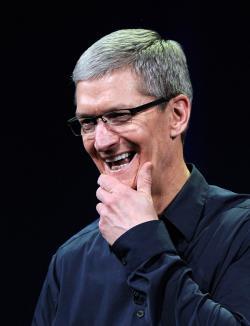During the past several years, Apple has become one of the most successful businesses in the history of mankind. The iPad 3 will be a huge hit, and Apple’s rivals have no products in their current pipelines that can hope to displace it. But in a strange way, Apple’s super-profits have been hurting the world economy. This morning’s announcement that America’s most valuable company will start paying a dividend and buying back shares is good news for growth at Apple, and elsewhere.
To some, of course, any kind of huge profits seem morally objectionable. That’s particularly true when so many of the workers involved in production for Apple toil long hours in brutal conditions for wages that are, by American standards, pathetic. That’s the kind of situation that seems to have inspired Mike Daisey to fabricate elements of reporting on conditions at Chinese factories where Apple products are made. But even without the fabrications, it’s true enough that these huge profits are made on the back of low-paid workers. Industry analyst Horace Dediu recently calculated that the actual manufacturing of an iPhone costs somewhere between $12 and $30 with labor costs only a fraction of that. The device has an average sale price of $630 (American consumers pay less than that because cellphone companies subsidize the price in exchange for a contract commitment) and operating margins of more than $300 per unit.
And yet the reality is that these jobs are highly desirable by Chinese standards. Rather than victimizing Chinese workers, Apple is in a small way helping them. What the country needs is not fewer electronics manufacturing jobs, but many more to reduce the number of people facing much bleaker economic prospects in rural areas.
The problem with Apple’s huge profits isn’t how they make the money, it’s been what they do with it. Or, rather, what they don’t do with it. Profits normally circle back out into the economy in one of several ways. Most business investment is directly financed by profits. Companies that are succeeding use profits to buy new capital equipment, to open new facilities, or to conduct research and development. Profitable companies also normally pay money out to their owners, either by issuing dividends or buying back shares. Putting cash into the hands of people who’ve made smart investments in the past gives those investors the funds necessary to buy more stuff or to make new investments. Last but by no means least, firms sometimes hold on to their profits in the form of stockpiling cash just the way that individuals might just stash some extra money in a bank account.
Holding cash reflects indecision and a desire to keep your options open. With a large pile of cash on hand you can make future acquisitions or investments at a moment’s notice. In normal circumstances, holding your profits in cash is just as good for the world economy as doing anything else with it. That’s because corporate cash hoards aren’t like Scrooge McDuck’s giant vault of gold coins: They’re held in money-market funds and short-term bonds. In micro terms, the funds that one company saves are available for other companies to borrow. In macro terms, the more saving that happens, the lower interest rates go, and low rates spur borrowing and investment. Funds flow through the economy, and everyone prospers regardless of individual firm-level decisions about what to do with profits.
At least that’s how the economy normally works. But for the past several years, the basic engine of the American economy has been stalled out. When nominal interest rates on the safest forms of debt hit zero, extra savings can’t push rates any lower to spur new borrowing. They can’t, at least, unless the Federal Reserve is willing to take some risks rather than stick with its current policy of guaranteed mass unemployment as preferable to the risk of embarrassing itself by trying something new. That means that when extra cash ends up in an already stocked corporate treasury, it does just pile up pointlessly. The same thing happens when oil exporting countries recycle their earnings from higher gas prices into American sovereign debt. During this anomalous period of zero interest rates, corporate cash stockpiling really does hurt the broader economy. And Apple is far and away the king of the cash stockpile, representing fully 36 percent of the $179 billion increase in U.S. corporate cash that we’ve seen since 2009. In fact, in 2011 the non-Apple part of corporate America stopped stockpiling and reduced its cash holdings by $6 billion. This was, however, more than offset by Apple’s addition of $46 billion to its own stockpile.
In other words, every decision to buy an iPad rather than a sofa has been hurting the American economy. The $10 billion in share buybacks and $10 billion per year in dividends announced today is good news for the American economy. Unfortunately for us, even though this is a ton of money by any normal standard, it will merely slow the growth of Apple’s cash, not actually reverse it. Still, it’s a start. And perhaps once Apple’s owners get a taste of the idea of actually sharing in the company’s massive profits, they’ll start clamoring for more.
